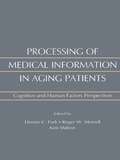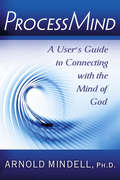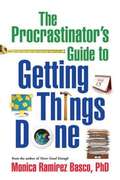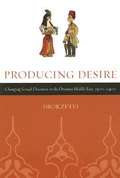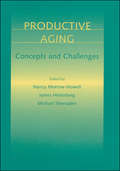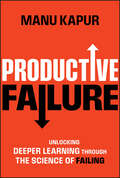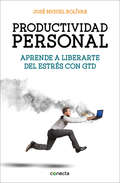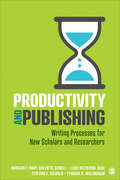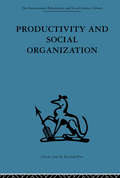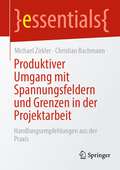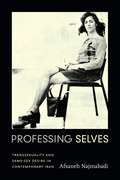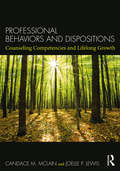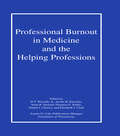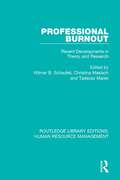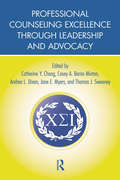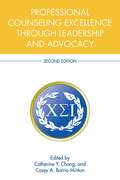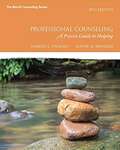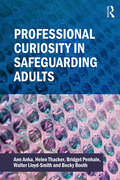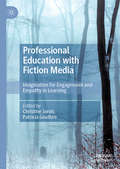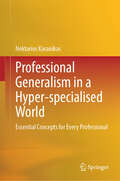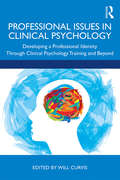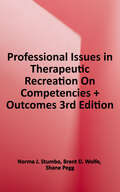- Table View
- List View
Processing of Medical information in Aging Patients: Cognitive and Human Factors Perspectives
by Denise C. Park Roger W. Morrell Kim ShifrenThis volume focuses on understanding the impact of age-related decline in cognitive abilities on medical decisions and compliance with medical instructions. It examines how medical information and the medical environment can be restructured to accommodate the decreased cognitive function associated with aging. Although the issues discussed in this book are of critical importance in providing effective health care, they have been largely neglected in the national debate over provision of health care for the increasingly aging population. It is essential that we begin to understand how to present information so that informed choices are made and patients comprehend well enough that they can follow their treatment regimens and understand the importance of those regimens. Divided into four major sections, this volume addresses the following issues: * the implications of cognitive aging for medical information processing; * aging and medical decision making; * aging and medication adherence; and * human factors design for medical devices and instructions.
Processmind
by Arnold MindellEinstein said, "I want to know the mind of God, the rest are details." This book is therapist Arnold Mindell's response. By processmind he means an earth-based experience of the universal state of consciousness that, he argues, pervades all reality. It is perhaps our most basic, least known, and greatest power, combining the nonlocality of modern physics with altered states of consciousness found in peak experiences. What makes this book unique is that it offers some experience of this mind-state to the reader. Mindell does so by connecting cosmic patterns seen in physics with experiences occurring in psychology and world spiritual traditions. He draws together ideas about Aboriginal totem spirits, quantum entanglement, and nonlocality to describe the "structure of God experiences." Enhancing his clear presentation are around 80 illustrations and 30 experiential exercises based on tested approaches that actualize our deepest, unitive consciousness. Through rational thinking and earth-based, inner experience, the reader can sense how the processmind's self-organizing intelligence helps with dreams, body symptoms, relationships, and large-group conflict issues. Altogether, the book is a kind of user's guide to tapping into an immense power that can benefit our own individual life and, ultimately, the world.
Procrastinator's Guide to Getting Things Done
by Robert Leahy Monica BascoEveryone waits till the last minute sometimes. But many procrastinators pay a significant price, from poor job performance to stress, financial problems, and relationship conflicts. Fortunately, just as anyone can endlessly delay, anyone can learn how to stop! Cognitive-behavioral therapy expert Monica Ramirez Basco shows exactly how in this motivating guide. Dr. Basco peppers the book with easy-to-relate-to examples from "recovering procrastinators"--including herself. Inviting quizzes, exercises, and practical suggestions help you Understand why you procrastinate. Start with small changes that lead to big improvements. Outsmart your own delaying tactics. Counteract self-doubt and perfectionism. Build crucial skills for getting things done today.
Prodigal Son
by John Patrick Shanley'What I admire most is that his plays are beautifully well made, economical, sharp and coherent. He's not a misanthrope, but he's in pursuit of why people behave as badly as they do along with having a great compassion for them. That's an unusual and interesting combination.'--Tony Kushner, on John Patrick ShanleyWhen a troubled but gifted boy from the South Bronx finds himself shipped off to a private school in New Hampshire, the adjustment to the alien environment will lead to his ultimate dissolution or redemption. Teachers in the affluent institution do not know what to make of the new boisterous student, though the challenge really lies in his self-perception. Like his most celebrated play, Doubt, the author has based this new work on his own personal experiences of growing up as a teenager in the South Bronx and his time spent at a prep school in New England. Shanley has created an elemental study of a young's man search for his place in the world.John Patrick Shanley's plays include Outside Mullingar, Danny and the Deep Blue Sea, Savage in Limbo, and Dirty Story, along with his "Church and State" trilogy, Doubt, Defiance, and Storefront Church. For his play Doubt, he received both the Tony Award for Best Play and the Pulitzer Prize for Drama. He has nine films to his credit, including the five-time Oscar-nominated Doubt, and Moonstruck, which received the Academy Award for Best Original Screenplay. The Writers Guild of America awarded Shanley the 2009 Lifetime Achievement Award in Writing.
Producing Desire: Changing Sexual Discourse in the Ottaman Middle East, 1500-1900
by Dror Ze’eviThis book brings into focus the sexual discourses manifest in a wealth of little-studied source material--medical texts, legal documents, religious literature, dream interpretation manuals, shadow theater, and travelogues--in a nuanced, wide-ranging, and powerfully analytic exploration of Ottoman sexual thought and practices from the heyday of the Ottoman Empire in the sixteenth century to the beginning of the twentieth.
Productive Aging: Concepts and Challenges (Gerontology)
by Michael Sherraden Nancy Morrow-Howell James Hinterlong"Will 69 million baby boomers suddenly drop out of the workforce when they turn 65? It is difficult to imagine this generation, with its talent, education, and experience, idling away the last thirty years of life."—From the Foreword, by Robert N. Butler, M.D., The Mount Sinai Medical CenterOld age has been historically thought of as a period of frailty and dependence, yet studies show that with the help of advances in health and medicine, current populations will live longer and remain healthier than previous generations. As average life expectancies rise, traditional concepts of retirement need to be reconsidered on all levels—from government policy to business practice to individual life planning. In this volume, leaders in the field of gerontology explore these changing conditions through the concept of "productive aging," which has been developed by leaders in the field to promote older adults' contributions to society in social and economic capacities.Productive Aging: Concepts and Challenges treats the implications of productive aging for the discipline of gerontology and for society in general. The first section defines the principles, historical perspectives, and conceptual frameworks for productive aging. The second section takes a disciplinary approach, treating the biomedical, psychological, sociological, and economic implications of a more capable older generation. The third section considers advances in theories of gerontology, and the fourth section suggests future directions in practice, theory, and research. Contributors: W. Andrew Achenbaum, University of Houston • Scott A. Bass, University of Maryland-Baltimore • Vern L. Bengtson, University of Southern California • James E. Birren, UCLA • Francis G. Caro, University of Massachusetts Boston • Carroll L. Estes, University of California-San Francisco • Marc Freedman, Civic Ventures (co-founder of Experience Corps) • James Hinterlong, Washington University • James S. Jackson, University of Michigan • Jane L. Mahakian, Pacific Senior Services • Harry R. Moody, Robert Wood Johnson Foundation • Nancy Morrow-Howell, Washington University • Philip Rozario, Washington University • James H. Schulz, Brandeis University • Michael Sherraden, Washington University • Alvar Svanborg, University of Illinois-Chicago and Goteburg University, Sweden • Brent A. Taylor, San Diego State University
Productive Failure: Unlocking Deeper Learning Through the Science of Failing
by Manu KapurDesign for and turn your failures into meaningful learning experiences Written by a leading global expert on human cognition, productive failure, and learning methods, Productive Failure shows you how to design the experience of failing. Research shows that repeated experiences of intriguing, constructive failure can help students (and our own children, and anyone else we lead) develop creativity and learn more deeply. When carefully curated, failure can become a signal for learning, not the noise detracting from it. The result? Learners gain a lifelong readiness to push themselves outside of their comfort zones, using setbacks as launchpads for learning and innovation. The evidence-based principles in this book are powerful, not only in formal schooling contexts, but also for anyone taking charge of and designing their own lifelong learning. From learning a new language or skill to setting up goals that push you past your limits, this book unpacks the science of Productive Failure and describes design principles—and specific strategies built upon them—that let you harness Productive Failure for your own benefit. Learn and understand the science of failure Apply the research-based Productive Failure framework in classrooms, teams, groups, and organizational settings Learn techniques like retrieval practice, generative problem-solving, motivational hacking, culture building, and so on to deepen learning experiences Reach new levels of critical thinking, innovation, and success by making failure the norm, not the exception, and learning how to cope with it This fascinating and actionable book is a must for educators, parents, managers, leaders, and anyone who needs to help others (or themselves) learn how to learn.
Productividad personal: Aprende a liberarte del estrés con GTD
by José Miguel BolivarUn sistema práctico de organización del trabajo que nos permite reducir el estrés, conseguir los resultados que deseamos, y que nos hace más eficaces en todos los aspectos de la vida. Productividad personal plantea como punto de partida el hecho de que la naturaleza del trabajo ha cambiado profundamente en la era de la información. Nuestras tareas ya no resultan evidentes y no sabemos bien cuándo están finalizadas; tampoco son estables ni predecibles, y lo que es más importante, no son proporcionales al tiempo que disponemos para hacerlas. Todo es nuevo más a menudo. Estos cambios han generado una situación de estrés creciente y general entre todos nosotros. Con demasiada frecuencia tenemos el sentimiento de que algo no va bien y que nos causará problemas, pero no sabemos ni de qué se trata, ni cuándo puede estallar y menos aún qué consecuencias puede tener. La metología GTD (creada por David Allen) parte del principio de que una parte importante de este estrés procede de los «compromisos mal gestionados». José Miguel Bolívar propone el uso de este método muy práctico para evitar que nuestra gestión dependa de la memoria, que es muy poco fiable, y nos introduce de forma muy sencilla y asequible en la fórmula GTD para la productividad personal, basada en herramientas para mantener el control de nuestras tareas y la perspectiva necesaria para tener claras las consecuencias a corto, medio y largo plazo de las decisiones que tomas.
Productivity and Publishing: Writing Processes for New Scholars and Researchers
by Margaret-Mary Sulentic Dowell Leah Katherine Saal Cynthia F. DiCarlo Tynisha D. MeidlProductivity and Publishing: Writing Processes for New Scholars & Researchers by Margaret-Mary Sulentic Dowell, Leah Katherine Saal, Cynthia F. DiCarlo, and Tynisha D. Willingham takes the challenges and confusion out of academic writing and journal publishing by empowering readers to find the writing process that works for them. Activities and writing exercises help readers determine their research agendas, set realistic writing goals, , and follow time-tested and editor-approved processes for writing and revising journal articles. Topics cover the writing and publishing process from start to finish, addressing common issues for new academics like avoiding the blank page, selecting an appropriate journal, dealing with reviews, and leveraging your research into multiple articles and a comprehensive research agenda. Experts weigh in on crucial topics such as scholarly metrics and exposure and offer a journal editor’s perspective on the writing and publishing process. Build your academic career on a solid foundation with Productivity and Publishing.
Productivity and Publishing: Writing Processes for New Scholars and Researchers
by Margaret-Mary Sulentic Dowell Leah Katherine Saal Cynthia F. DiCarlo Tynisha D. MeidlProductivity and Publishing: Writing Processes for New Scholars & Researchers by Margaret-Mary Sulentic Dowell, Leah Katherine Saal, Cynthia F. DiCarlo, and Tynisha D. Willingham takes the challenges and confusion out of academic writing and journal publishing by empowering readers to find the writing process that works for them. Activities and writing exercises help readers determine their research agendas, set realistic writing goals, , and follow time-tested and editor-approved processes for writing and revising journal articles. Topics cover the writing and publishing process from start to finish, addressing common issues for new academics like avoiding the blank page, selecting an appropriate journal, dealing with reviews, and leveraging your research into multiple articles and a comprehensive research agenda. Experts weigh in on crucial topics such as scholarly metrics and exposure and offer a journal editor’s perspective on the writing and publishing process. Build your academic career on a solid foundation with Productivity and Publishing.
Productivity and Social Organization: The Ahmedabad experiment: technical innovation, work organization and management
by A. K. RiceTavistock Press was established as a co-operative venture between the Tavistock Institute and Routledge & Kegan Paul (RKP) in the 1950s to produce a series of major contributions across the social sciences. This volume is part of a 2001 reissue of a selection of those important works which have since gone out of print, or are difficult to locate. Published by Routledge, 112 volumes in total are being brought together under the name The International Behavioural and Social Sciences Library: Classics from the Tavistock Press. Reproduced here in facsimile, this volume was originally published in 1958 and is available individually. The collection is also available in a number of themed mini-sets of between 5 and 13 volumes, or as a complete collection.
Produktiver Umgang mit Spannungsfeldern und Grenzen in der Projektarbeit: Handlungsempfehlungen aus der Praxis (essentials)
by Christian Bachmann Michael ZirklerProjektleitende erleben vielfältige Spannungsfelder in ihrer Arbeit und sind dabei besonders exponiert. Das Buch erklärt die verschiedenen Spannungsfelder, denen Projektverantwortliche ausgesetzt sind und zeigt, wie ein nachhaltiger Umgang über Grenzmanagement gelingen kann, damit die anspruchsvolle Aufgabe mit Freude, Erfolg und bleibender Gesundheit erledigt werden kann. Praktische Hinweise zur produktiven und nachhaltigen Gestaltung der Projektleitungsrolle werden aus Sicht der Praxis vorgestellt.
Professing Selves: Transsexuality and Same-Sex Desire in Contemporary Iran
by Afsaneh NajmabadiSince the mid-1980s, the Islamic Republic of Iran has permitted, and partially subsidized, sex reassignment surgery. In Professing Selves, Afsaneh Najmabadi explores the meaning of transsexuality in contemporary Iran. Combining historical and ethnographic research, she describes how, in the postrevolutionary era, the domains of law, psychology and psychiatry, Islamic jurisprudence, and biomedicine became invested in distinguishing between the acceptable "true" transsexual and other categories of identification, notably the "true" homosexual, an unacceptable category of existence in Iran. Najmabadi argues that this collaboration among medical authorities, specialized clerics, and state officials--which made transsexuality a legally tolerated, if not exactly celebrated, category of being--grew out of Iran's particular experience of Islamicized modernity. Paradoxically, state regulation has produced new spaces for non-normative living in Iran, since determining who is genuinely "trans" depends largely on the stories that people choose to tell, on the selves that they profess.
Professional Behaviors and Dispositions: Counseling Competencies and Lifelong Growth
by Candace M. McLain Joelle P. LewisProfessional Behaviors and Dispositions teaches counselors in training (CITs) how to cultivate counselor competencies and critical thinking skills in support of lifelong professional development. CITs will first gain a detailed understanding of the professional behaviors and dispositions expected of all counselors. They will then learn how to evaluate themselves for these factors using a universal growth model that promotes holistic, ongoing assessment of oneself and one’s relationships. Next, CITs will be presented with concrete tools and activities that they can use to cultivate and retain counselor competencies. Finally, CITs are given a step-by-step guide for creating a professional growth plan they can use throughout their program and their clinical practice. Accompanying this text is a helpful online faculty guide for supervisors to use while working with CITs. Aligned with CACREP, ACA, and ACES standards, this textbook will be useful for all graduate students training to become counselors.
Professional Burnout in Medicine and the Helping Professions
by Jr. Austin H. Kutscher Elizabeth J. Clark Florence E. Selder D. T. Wessells Irene B. Seeland Daniel J. ChericoPhysicians and other helping professionals have created a practical, hands-on book that will aid in the identification and reduction of job stress. Nurses, physicians, thanatologists, and psychotherapists are among the growing number of health care professionals whose physical and mental health are being severely affected by work stress. This unique volume achieves what no earlier book has attempted for this specialized professional group. It offers a thorough understanding of professional burnout, elaborating how burnout develops and offering a model with which to identify job stressors. Professional Burnout in Medicine and the Helping Professions also offers an in-depth exploration of stress and burnout issues from the perspectives of specific medical and helping profession disciplines--physicians, nurses, social workers, psychotherapists, teachers, consultants, agency and hospital workers, funeral directors, and more.Experts in these fields examine the values, ethics, and morality of individuals, health care organizations, and society that may lead to burnout This in-depth and highly practical volume identifies the stages of disillusionment and offers successful intervention strategies for recognizing the signs and reducing or efficiently managing causative factors.
Professional Burnout: Recent Developments in Theory and Research (Routledge Library Editions: Human Resource Management)
by Christina Maslach Tadeusz Marek Wilmar B. SchaufeliA rapidly growing number of people experience psychological strain at their workplace. In almost all industrialized countries, absenteeism and turnover rates increase, and an increasing amount of workers receive disablement benefits because of psychological problems. This book, first published in 1993, concentrates on a specific kind of occupational stress: burnout, the depletion of energy resources as a result of continuous emotional demands of the job. This volume presents theoretical perspectives that had been developed in the United States and Europe, discusses methodological issues, and examines organisational contexts. Written by an international group of leading scholars, this book will be of interest to students of both psychology and human resource management.
Professional Counseling Excellence through Leadership and Advocacy
by Thomas J. Sweeney Andrea L. Dixon Catherine Y. Chang Casey A. Barrio Minton Jane E. MyersThis text will be a valuable resource for counseling students and educators to assist in the incorporation of leadership and advocacy training into the counseling curriculum, based on the new standards set forth by the Council for Accreditation of Counseling and Related Educational Programs (CACREP). Readers will acquire a broad scope and vision of leadership and advocacy which includes client advocacy, advocacy for the counseling profession, and social justice. It identifies the historical context of leadership and advocacy, provides a framework from which to understand these concepts, and provides concrete examples of leadership and advocacy happening in the field today. Chapters describe the design of an effective counselor education curriculum, supervision of counselors, and leadership and advocacy practice in various counseling settings. Edited by leaders in the field of counselor education and endorsed by Chi Sigma Iota, this text will provide students with the knowledge, skills, and qualities to succeed as leaders and advocates throughout their counseling careers.
Professional Counseling Excellence through Leadership and Advocacy
by Catherine Y. ChangProfessional Counseling Excellence through Leadership and Advocacy provides readers with the knowledge, skills, and qualities to succeed as leaders and advocates throughout their careers. Edited by leaders in counselor education and endorsed by Chi Sigma Iota, this text places leadership and advocacy in a historical context while strengthening the foundational knowledge and skills counselors need. The new edition integrates the Multicultural and Social Justice Counseling Competencies (MSJCCs) and applies them to a variety of counseling settings at both local and state levels. Chapters also address leadership and design of effective counselor education programs, curricular implications, supervision and consultation, and research directions. The new edition is designed for counselor educators and supervisors and doctoral-level counselor education students who are studying leadership and advocacy as one of five core areas within the 2016 CACREP standards and for master’s level students and practitioners who are growing their leadership and advocacy skills.
Professional Counseling: A Process Guide to Helping
by Harold Hackney Janine BernardThis package includes the bound book and MyCounselingLab® with Pearson eText. Bridging the gap between theory and practice, Hackney and Bernard’s The Professional Counselor offers a solid grounding in counseling skills and an understanding of how these skills are used within different therapy orientations, including affective, cognitive, behavioral, and systemic domains. It presents students with a four-stage model of counseling which shows them how to assess client problems, develop counseling goals, define strategies and select interventions, and terminate and evaluate the counseling relationship. The new co-author of this edition, Janine M. Bernard, brings her expertise in clinical supervision to help deconstruct the counseling process for learners, resulting in effective editing of all chapters in this edition. Also included is a discussion of the application of counseling interventions to Dialectical Behavior Therapy and Motivation Interviewing, so that students can appreciate that skills are not distinct from therapy approaches they will use in their clinical courses. Included are new case examples drawing from different specialties within counseling, and more than 40 new web-based video samples illustrating the content of the book.
Professional Curiosity in Safeguarding Adults
by Bridget Penhale Ann Anka Helen Thacker Walter Lloyd-Smith Becky BoothThis is an essential text for students at all levels studying social work, nursing and allied health and social care, focusing on the need for professional curiosity and partnership work in safeguarding adults. Professional curiosity is a vital element of professional health and social care practice, yet information and guidance are scarce. Considering the post-pandemic landscape and the legal policy context of partnership work, this text provides a detailed examination around definitions of professional curiosity and what those mean in practice in relation to vulnerable adults. Real life examples are woven throughout based on serious case reviews, safeguarding adults’ reviews, domestic homicide reviews and extensive research, and there are numerous opportunities for readers to test their knowledge and skills.
Professional Education with Fiction Media: Imagination for Engagement and Empathy in Learning
by Christine Jarvis Patricia GouthroThis book analyses how narrative fictions can be used by faculty and staff in the teaching of professionals in higher education. As professional life becomes ever more demanding, this book draws together the work of researchers and practitioners who have explored the tremendous impact that narrative fictions – novels, short stories, drama and poetry – can have on development. The editors and contributors posit that fiction can help professionals imagine new ways of being, reinvent their roles and tackle problems without a road map. Using fiction can also provide a safe place for the exploration of ethics and decision making, as well as furnishing tools for the development of empathy and engagement by offering vicarious experiences of drastically different lives and situations. A medium that by its very nature contains a multiplicity of interpretations, using fiction in professional education can enhance the education of professionals working in a range of disciplines, including health, education, social care, law and science.
Professional Ethics for School Psychologists A Problem-solving Model Casebook
by National Association of School PsychologistsStrengthen your professional ethical identity with the newest edition of Professional Ethics for School Psychologists. This resource helps you effectively interpret and put into practice the field's ethical principles. With over 150 real and fictional cases, you'll increase your ability to navigate through competing ethical principles and conflicting interests.
Professional Generalism in a Hyper-specialised World: Essential Concepts for Every Professional
by Nektarios KaranikasThis book challenges the notion that extreme professional expertise is the only path to success, advocating instead for the concept of 'professional generalism' as a complementary approach. It brings together ideas from various disciplines, offering insights relevant to all professionals, regardless of specialisation. The chapters of the book explore concepts and frameworks that are not typically discussed together in a single work and challenge the reader to test and contextualise them. The book aims to inspire professionals to explore principles beyond their usual scope and to recognise opportunities to integrate concepts from other disciplines into their practice. It encourages readers to consider how different approaches and perspectives can intersect and complement each other, breaking down professional silos and fostering a more interconnected way of thinking. Rather than promoting simplistic or middle-ground solutions, the book emphasises the value of considering diverse perspectives and approaches, recognising that different contexts may require different paradigms. It encourages readers to embrace complexity and diversity, fostering a holistic and nuanced perspective essential for navigating today's interconnected professional landscapes.
Professional Issues in Clinical Psychology: Developing a Professional Identity through Training and Beyond
by Will CurvisProfessional Issues in Clinical Psychology: Developing a Professional Identity through Training and Beyond offers insights from a range of trainee, recently qualified and experienced clinical psychologists as they reflect on the process of developing their professional identity through consideration of dilemmas and issues they experienced through clinical psychology training. Reflecting the breadth of the profession and the range of services in which clinical psychologists work, the chapters highlight the different types of roles that clinical psychologists are expected to undertake throughout training and post-qualification. The book provides practical clinical recommendations that can be applied in work settings in line with contemporary research, policy and guidance, as well as personal reflections from the authors on how managing professional issues has shaped their practice as a developing clinical psychologist. Developing a professional identity as a clinical psychologist is vital in learning to navigate these challenges. The process by which a professional identity develops is an individual journey. However, Professional Issues in Clinical Psychology offers aspiring, trainee or qualified clinical psychologists - and other healthcare professionals - with a contemporary resource around professional issues which might be encountered within clinical psychology practice.
Professional Issues in Therapeutic Recreation: On Competencies and Outcomes
by Norma J. Stumbo Brent D. Wolfe Shane PeggThe latest edition of Professional Issues in Therapeutic Recreation On Competence and Outcomes recognizes that the profession must continue to challenge the status quo and one another. Issues and ideas are not stagnant; they are forever changing, and the various sections and chapters of this edition will challenge the reader to conceptualize ideas from new perspectives and in a new light. Readers are encouraged to wrestle with the ideas presented. Do not simply read them and file the information away. Interact with the ideas. Discuss the ideas. Argue about the ideas. Whatever you do, do not simply disregard an idea because it represents a viewpoint or perspective that is different from your personal philosophy related to the profession. We challenge all readers to be drawn into the variety of topics, concepts, and perspectives presented in this volume so each can continue to personally grow and enable the profession to continue to grow. Like the first two editions, this effort has four major sections: Introduction, Education, Practice, and Research. It is clear that these divisions are largely arbitrary, as every practice issue affects every research issue, every education issue affects every practice issue, and on and on. However, books require an organizational layout, and these divisions appear to make sense. Each section begins with a Keynote chapter aimed at setting the stage for that particular section. Each section also ends with a Perspective chapter, largely an opinion or viewpoint piece to encourage readers to continue discussion on related issues.
